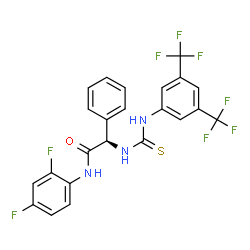| Description |
BL-918 is a small molecule activator of ULK1 with EC50 of 24 nM (243% kinase activity at 100 nM), induces autophagy via the ULK complex in SH-SY5Y cells; displays a cytoprotective effect on MPP+-treated SH-SY5Y cells, as well as protected against MPTP-induced motor dysfunction and loss of dopaminergic neurons by targeting ULK1-modulated autophagy in mouse models of PD.
|
| Related Catalog |
|
| Target |
ULK1:24.14 nM (EC50)
|
| In Vitro |
BL-918 (5 μM; for 24 hours) induces autophagy in Neuron-Like cells[1]. BL-918 (0.5-50 μM; for 24 hours) can partially reverse MPP+-induced cell death, which is determined by enhancing cell viability[1]. BL-918 (5 μM; for 6-36 hours) time-dependently elevates the expression levels of LC3-II, Beclin-1, and its phosphorylation status, whereas reduces the level of the selective autophagy substrate SQSTM1/p62. BL-918 elevates Ser317 and Ser555 phosphorylation of ULK1, as well as decreases Ser757 phosphorylation of ULK1[1]. BL-918 binds to ULK1 with a high binding affinity (KD=0.719 μM)[1]. Cell Autophagy Assay[1] Cell Line: SH-SY5Y cells Concentration: 5 μM Incubation Time: For 24 hours Result: Induced Autophagy. Cell Viability Assay[1] Cell Line: SH-SY5Y cells Concentration: 0.5, 5, 50 μM Incubation Time: For 24 hours Result: Could partially reverse MPP+-induced cell death, which was determined by enhancing cell viability. Western Blot Analysis[1] Cell Line: SH-SY5Y cells Concentration: 5 μM Incubation Time: 6, 12, 24, 36 hours Result: Time-dependently elevated the expression levels of LC3-II (a key marker of autophagy), Beclin-1, and its phosphorylation status, whereas reduced the level of the selective autophagy substrate SQSTM1/p62.
|
| In Vivo |
BL-918 (20, 40, or 80 mg/kg/day; oral gavage; began 2 days before the first injection of saline/MPTP and continuously maintained for 5 days after the last injection of saline/MPTP) attenuates the loss of DA and its metabolites. BL-918 obviously decreases the levels of dopamine (DA), 3,4-dihydroxyphenylacetic acid (DOPAC), and homovanillic acid (HVA)[1]. Animal Model: Male C57BL/6 mice (eight-week old) weighing between 20 and 25 g[1] Dosage: 20, 40, or 80 mg/kg Administration: Oral gavage; daily; began 2 days before the first injection of saline/MPTP and continuously maintained for 5 days after the last injection of saline/MPTP Result: Attenuated the loss of DA and its metabolites.
|
| References |
[1]. Ouyang L, et al. Small-Molecule Activator of UNC-51-Like Kinase 1 (ULK1) That Induces Cytoprotective Autophagy for Parkinson's Disease Treatment. J Med Chem. 2018 Apr 12;61(7):2776-2792.
|
